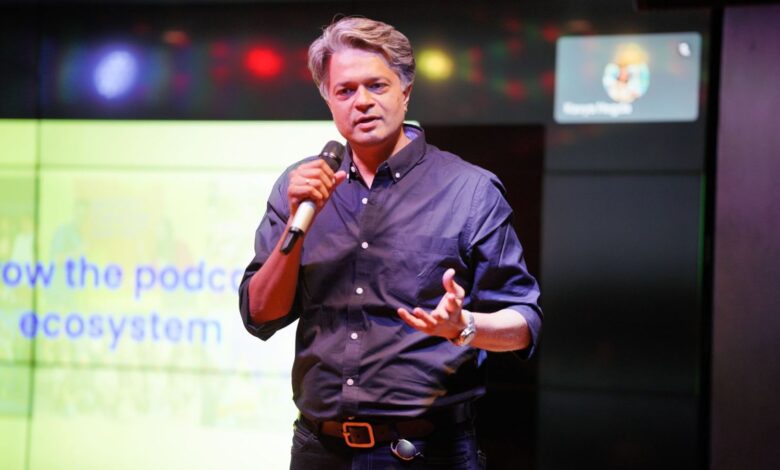‘Podcasts spark conversations, connect creators with leners’: Spotify’s Dhruvank Vaidya | Technology News

Over the years, podcasts have emerged as a popular medium for information consumption. Today, there are hundreds of podcasts across diverse topics ranging from hory to current affairs. “What a podcast brings is conversation. When it is a personal conversation, you are able to understand the tone and the context, and it is much more. You are able to absorb much more information,” said Dhruvank Vaidya, head of music and podcasts, Spotify India.Vaidya, who recently sat down with , shared some insights about the growing podcast ecosystem in India, essentially how user preferences are shaping it and the music streamer’s role in nurturing this rapidly growing medium.
As a platform connecting creators with leners, Spotify takes a neutral stance on content creation and at the same time ensures that necessary safeguards are in place, he said. “Spotify is a platform, and what we do is give access to the best content from all over the world to our audience,” explained Vaidya. “We don’t create any shows, so we don’t have a point of view on that content.”
Story continues below this ad
Asked about the rising spate of misinformation around the world, Vaidya asserted that content regulations continue to be a priority through its internal mechanisms. “In terms of guardrails, we have our internal trust and safety mechanisms and content guidelines, which we use to track all the content that comes in,” he said.
On how Spotify was fostering creators, Vaidya said that while acknowledging that podcasts are a new medium, the platform has established multiple touchpoints to ass creators. “We do a lot of master classes and on-ground events where we train people on how to do podcasts,” he added. The platform also offers ‘Spotify for Creators’, a tool offering guidelines, techniques, and valuable consumption data.
Moreover, the Discovery Mode prominently features in Spotify’s creator support strategy through curated collections such as ‘Learn in 10 Minutes’ and ‘Life lessons from inspiring people’. “We help podcast discovery quite actively. We have on-platform promotion tools that we use to promote podcasts,” Vaidya noted.
He said the recommendation engine combines manual curation with technology that uses the lening hory of the user and people who have similar lening profiles.Story continues below this ad
Gen Z and new trends
Vaidya said that Generation Z – which refers to people born between the mid-1990s and early 2010s – has emerged as a powerful demographic consuming podcasts. “A survey done YouGov in April 2024 said that seven out of 10 Gen Z users len to a podcast weekly,” Vaidya revealed. According to the Spotify executive, for Gen Zs, podcasts serve dual purposes – learning and having authentic conversations.
He said that role models significantly influence Gen Z’s podcast preferences. “Role models are one big set of podcasts that Gen Z lens to, who they can kind of emulate and learn from. Nikhil Kamath is a classic example.”
On the other hand, millennials with their workplace and life experiences gravitate towards professional development content. “Continuing to learn is very important; ongoing learning will help them in their careers,” Vaidya said. Their topics of interest include startups, pitching to VCs, and target market strategies.
Other than professional growth, they seek ‘motivation and inspiration’, which he described as “another very big space for millennials.” Notably, devotional content also does really well on podcasts among this age group.Story continues below this ad
Since many users are turning to podcasts for content related to upskilling, leadership stories, financial advice, etc, we asked if there were any popular educational or self-help podcasts that were creating an impact. Vaidya said that the platform’s educational podcast landscape features notable creators like Raj Shamani, whose show, ‘Figuring Out’, focuses on enrichment. “He believes that every conversation or every guest on the platform should enrich the audience in a certain way,” said Vaidya.
On the other hand, financial education also garners significant interest. Vaidya shared the example of Monica Halan’s podcast ‘Let’s Talk Money’. Other impactful shows include the Think School podcast on business and geopolitics and Huberman Lab covering health and wellness.
Since sharing financial or educational advice requires a great deal of trust, we reached out to Monica Halan to understand how one can maintain credibility and trust in the age of podcasts.
“The credibility comes from not having skin in the game – I am not selling any product. I do not benefit if the audience buys a certain brand. Therefore, I give strategic advice and do not comment on or recommend specific companies or product names. I also focus on communicating tools rather than specific 5-products-to-buy kind of advice. My idea is to empower the audience to make their own decisions. That way they can always be in control of their financial lives and do not need to keep coming back for the next set of products,” Halan told .Story continues below this ad
Flourishing amid waning attention spans
The attention span of the average human being is getting shorter as time passes. However, even as reading habits continue to plummet, podcasts – even those lasting over two hours – have sustained leners. When asked what makes podcasts so appealing, Vaidya attributed it to the ‘intimate’ nature of its consumption. “I am sitting in a room myself, and this expert in their subject is talking to me. And in this one hour, two hours, I can get the benefit of their entire life learning,” he said.
Unlike long-format articles, which are text-heavy and least interactive, podcasts offer conversational engagement, explained Vaidya. According to him, access to expertise is yet another compelling draw. “Today, this kind of guidance is available on a podcast. You can get to experts, and they will tell you and answer the questions that are in your mind.”
The tech executive shared that in India, podcast consumption on Spotify extended beyond English to around 13 other languages. “Hindi remains significant, but Tamil podcasts are really big. Bengali also has a giant tradition of audio,” noted Vaidya. More cities across India are also embracing this medium.







